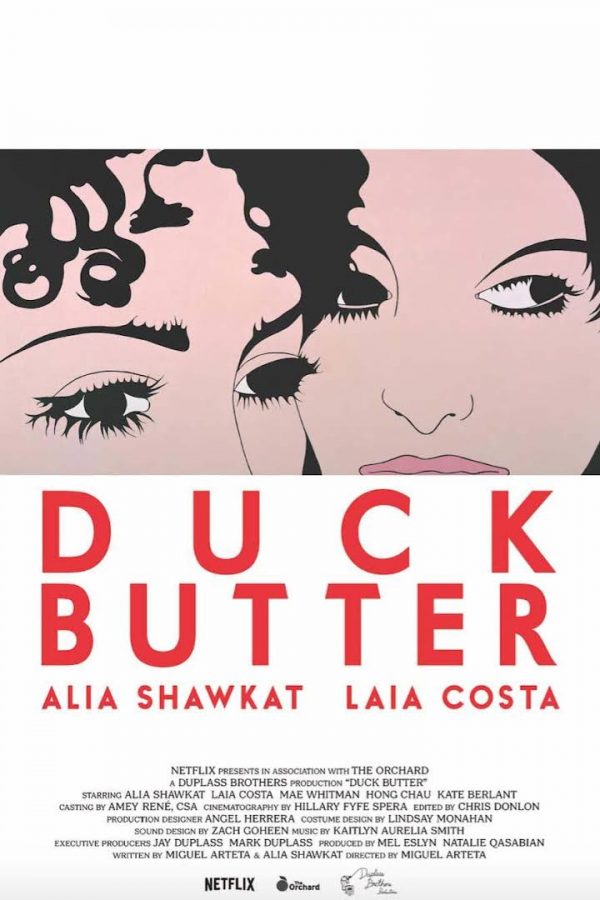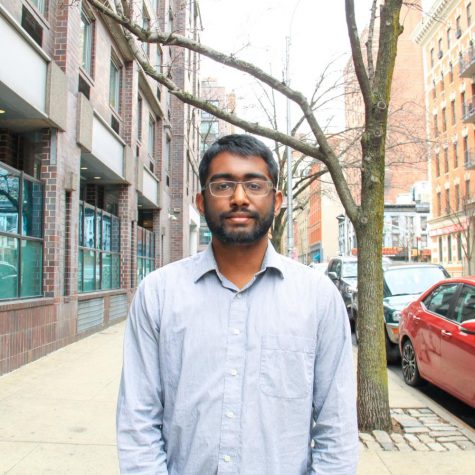Tribeca 2018: ‘Duck Butter’ Is Experimental Intimacy
Courtesy of Tribeca Film Festival
Poster for “Duck Butter,” which premiered at Tribeca Film Festival this past week.
April 25, 2018
Bold, beautiful and absurd: Everything Miguel Arteta’s dramedy “Duck Butter,” which premiered at Tribeca Film Festival on Friday, April 20, aspires to be and what it mostly achieves as well. Driven by naturalistic performances, heartfelt and hilarious dialogue and a somewhat absurdist view of relationships and intimacy, Arteta’s new film is a wonderful watch until its ending.
Naima (Alia Shawkat), an anxious actress, and Laia (Laia Costa), a free spirited musician, meet in a bar and quickly become friends. Jaded by dishonest relationships and frustrating social constructs, the two decide to spend 24 uninterrupted hours together, having sex on the hour. The women try to use their romantic experiment to find a new way of creating intimacy, but they run into difficulty confronting important truths about one another.
“Duck Butter” seems to be heavily inspired by the mumblecore film movement which has become synonymous with the Duplass brothers, who produce and make appearances in the film. Mumblecore films are shot with fairly raw, naturalistic acting, predominantly focus on non-mainstream topics and consist of adults in their 20s and 30s — characteristics of “Duck Butter.” In the film’s opening minutes, the Duplass brothers poke fun at their own improvisational filmmaking methods as Naima goes to work on a new film of theirs and has difficulty adapting to their niche style.
The cameos by the Duplasses and Kumail Nanjiani (“The Big Sick”) at the beginning were hilarious, but most of the movie is dominated by strong performances from Shawkat, who co-wrote the film, and Costa, whose chemistry is emotionally charged. Naima is caged in; having been hurt in the past and with a struggling acting career, her anxiety stops her from honestly living in the moment. Even in the scenes where she starts to open up, Shawkat still subtly portrays how difficult it is for her to break out of her shell. In contrast, Laia, who gives the more memorable performance, is like a wild animal (sometimes literally) who wrestles with the idea of being tamed. Although she is very open and trusting, it seems it is difficult for her to place her heart in anyone’s hands — whether it be Naima or even her mother.
While the characters are experimenting with their sexual intimacy, underneath lies a stinging exploration into the difficulties of commitment. It is fitting that both characters are artists, each with their own unreliable profession and sensationalized social perception of what they do, mirroring the complications of being in love.
Arteta seamlessly maneuvers the film’s tonal shifts, moving in and out of comedy and drama. Although there are many sex scenes, not all of them feel erotic — depending on the previous scene, the audience is either watching two friends having the time of their lives or two star-crossed lovers forcing a strange catharsis through sex that may or may not be helpful. The film is uncompromising in how its characters have to face hard truths about themselves and features a type of honesty that is glossed over in the mainstream romantic comedy and only gets more impactful and disturbing as the film progresses.
“Duck Butter” is an engaging insight into intimacy and commitment, but stumbles toward the end. Had the film depicted another day in the characters’ lives, it may have had a more satisfying conclusion. Though abrupt, the ending may be more effective for some, leaving the hope for love up in the air, as is the case with many relationships.
Tribeca Film Festival 2018 began on April 18 and will run through April 29. Screening information is available via its website.
Email Guru Ramanathan at [email protected].




























































































































































